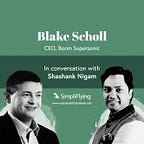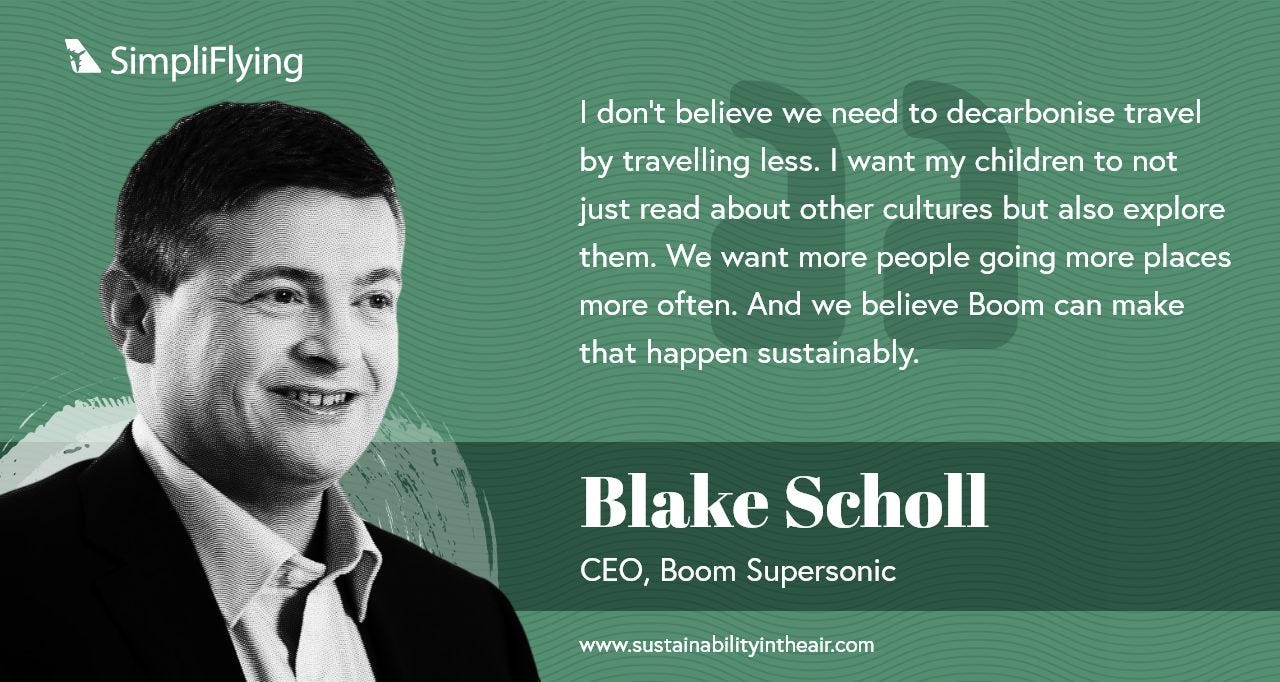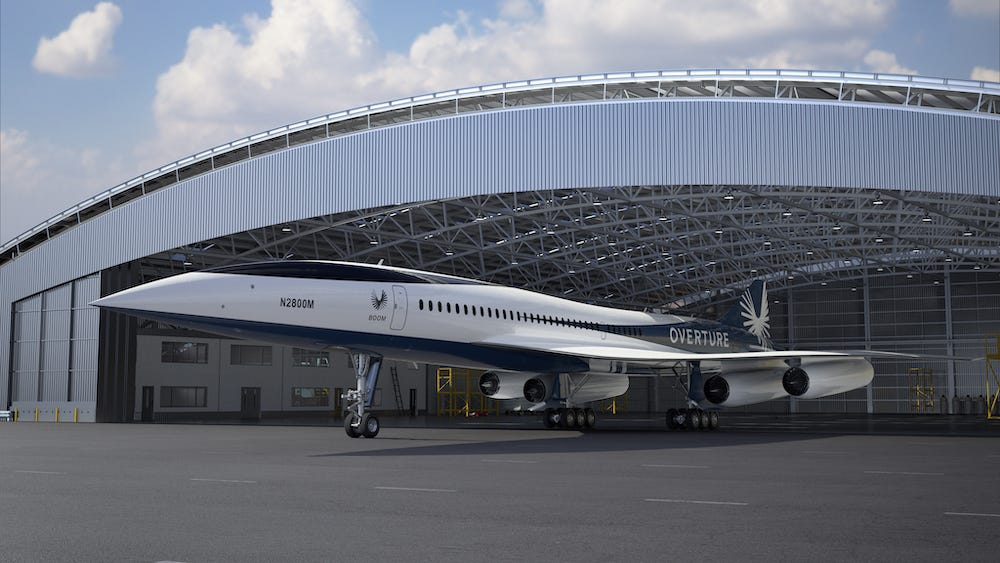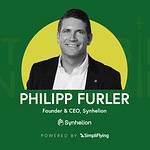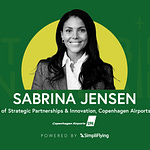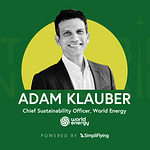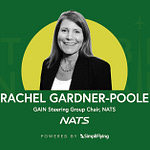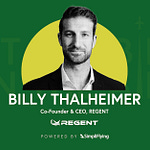Welcome to Season 2 of Sustainability in the Air, the world’s first podcast dedicated to sustainable aviation. Through in depth conversations with top aviation leaders, we break through the clutter and provide a clear roadmap for a net-zero future.
Nearly 20 years after we bade goodbye to the Concorde, supersonic air travel is set to make a comeback with startup Boom Supersonic’s Overture aircraft. Since supersonics are notorious for their high fuel consumption, it seems counter-intuitive to think of them as potentially sustainable. However, Boom Supersonic CEO Blake Scholl took on the challenge when he founded the startup in 2014, and appears set to deliver what would be the world’s fastest airliner that’s green to boot. Having optimised the Overture for speed, safety, and sustainability, Boom expects to commence commercial passenger flights starting 2029.
In the first episode of the second season of our ‘Sustainability in the Air’ podcast, Scholl speaks with SimpliFlying CEO Shashank Nigam and shares why the revival of supersonics is an idea whose time has come.
You can listen and subscribe to our podcast on all major podcast platforms or read our deep dive into the episode below.
If you’re rushed for time, you can also directly jump to your topic of interest by referring to these time-stamps:
Blake’s story & why he started Boom Supersonic (1:55)
Funding and convincing investors (6:00 & 8:30)
What about the engine? (7:15 & 10:00)
100% Sustainable Aviation Fuel (10:45)
Criticisms about Boom (15:25)
Non-CO2 impacts of aviation and dealing with sonic boom (19:20)
Learnings from Concorde & Challenges (24:00 & 29:40)
Dealing with sceptics (31:50)
Rapid Fire! (36:05)
Boom! You’re there!
Boom was born out of Scholl’s love for aviation and his admiration for the Concorde, which he believes belongs in the sky and not in museums. So he set out to investigate the challenges and cons of supersonics. He quickly discovered that the holy trinity of tech, markets and regulation already existed for the idea to take off. All it needed was implementing conventional complex ideas, and making them sustainable in the long run.
Scholl claims that the Overture can fly on hundreds of routes across the world. Being a supersonic aircraft, it offers the advantage of high speed and will significantly cut down flight time. Over water, the Overture can fly with speeds of up to Mach 1.7. This is nearly twice as fast as current commercial jets but less than Concorde’s top speed of Mach 2.04. The speed, however, goes down to Mach 0.94 over land, which is still a 20% speed advantage over subsonic airplanes. With speeds this high, the Overture is expected to turn three-day business trips into one-day hops!
100% SAF
Scholl recognises the need to decarbonise aviation but flying less is not one of his proposed solutions to the problem. As a strong advocate for travelling around the world, he describes it as an incredibly humanising experience which just needs to be undertaken more sustainably. While short-haul aviation shows a great deal of promise with battery and electric technologies, longer flights require high energy density fuels. Even though Hydrogen-based technology is a good solution, it isn’t without its infrastructural challenges. So, the best option at hand is Sustainable Aviation Fuel (SAF) or synthetic fuels made using carbon removed from the atmosphere.
The Overture will be the first airliner capable of running on 100% SAF, without blends or additives – a stark distinction from current aircraft that rely on jet fuel blends and additives to function. This, Scholl claims, will significantly cut down emissions and may even pave the road to net zero, given the right feedstock. However, SAF has its challenges too. It remains in short supply and costs too much.
Given the high fuel consumption of supersonics, Overture being run on 100% SAF has often been called too costly to be feasible. In the first season of our podcast, ICCT’s Dan Rutherford pointed out that with 15 Overtures capable of consuming 360 million gallons of SAF, Boom’s venture could potentially setback the entire industry’s sustainability efforts!
Scholl is quick to dismiss the figures as he remains optimistic about SAF’s trajectory and likens it to renewables like solar and wind, which have over time become the cheapest sources of energy. Incentives like inflation reduction act signed in law and tax credits are likely to drive growth and reduce prices, he asserts.
Moreover, third generation SAF relies on Carbon Capture technology run by green electricity sources, and can be infinitely scaled as long as there’s enough carbon in the atmosphere and the requisite infrastructure and investment. Scholl believes Boom is helping catalyse these investments and hence promoting SAF development for the entire industry.
Boom Boom… Pow?
A major concern associated with Supersonics is the deafening thunder-like noise called sonic boom. Sonic booms are heard on the ground when an aircraft travels faster than the speed of sound. However, it isn’t just the noise that’s the issue, sonic booms can also cause physical damage, break glass and crack plaster. A boom from a fighter aircraft in 1966 had dislodged tons of rock, crushing archaeological sites in the Canyon de Chelly National Monument in Arizona.
The Overture aims to fly at a speed of Mach 0.94 (~322 m/s) over land, which is slightly under the speed of sound (~330 m/s). This does not, however, completely eliminate the issue of sonic booms and more improvements can be expected in the subsequent versions of the Overture, Scholl claims.
Supersonics have also earned a bad reputation for being loud, windows rattling, disturbing local communities. The Overture has been carefully designed to meet the most stringent noise regulations that apply to current subsonic aircraft, states Scholl. This has been possible through engine design that doesn’t use afterburners, adjusting wing geometry and software optimisations.
Moreover, Boom has also worked with leading scientists to account for non-CO2 emissions. They have actively tried to reduce contrails by flying higher in the atmosphere such that there’s less water vapour.
“We want to be the Switzerland of sustainable aviation fuel and be a catalyst wherever we can be. Any time we see a promising tech we’re going to go make a bet on it and do everything we can to help that scale.”
Lessons from the Concorde
Given Scholl’s admiration for the Concorde, Boom has been built on the learnings from the popular supersonic airliner. Scholl points out that Concorde was a meticulously engineered aircraft but was economically unsustainable. Scholl insists that Boom will step around Concorde’s mistakes and ensure that their business model remains profitable while offering affordable services to airlines and passengers.
Concorde offered flights at about $12,000 about 20 years ago, nearly 4 times the price of first class air travel with 100 seats. Even on the most profitable routes, the aircraft flew at half capacity. Overture flights, Scholl states, will be far more affordable, with prices at par with the current business class tickets (1/4th the price of the Concord!), just 65 seats and routes across the world.
Given the Overture’s pricing, Boom can easily target millions of people who fly business class internationally. This already casts a wider net and offers greater accessibility than the Concorde.
To the sceptics and naysayers
Scholl admits that building the Overture has been tough, to the point it almost seemed impossible to everyone else. He has always encouraged his team to focus on customers and on execution, and deliver their promised product. While Boom does face a lot of challenges and has a lot of learning ahead of them, Scholl believes in what they're doing and knows that it's possible.
For example, Boom already has more orders and pre-orders than the Concorde ever did; it has partnered with leading airlines like United, American and Japan Airlines; has raised $600m in funding; and the Overture will be the first completely independently developed aircraft since the Douglas in 1921! What’s more, a one-third scale demonstrator aircraft called XB-1 has completed preliminary tests and is ready for actual flight runs later this year. To engine sceptics, Scholl promises a reveal later this year that will put to rest the pessimism ever since the Rolls-Royce collaboration fell through.
As Scholl himself says, had this been easy someone would have already done it. That someone, he firmly believes, will be his company Boom Supersonic.
Our Take
The aviation industry is difficult to decarbonise. As we begin this season of our podcast, we remain conscious of the fact that each day draws us closer to the catastrophic consequences of climate change. We need better strategies, regulations, collaborative efforts and better technologies, at a pace and scale never imagined before.
Boom Supersonic’s Overture promises to transform aviation such that supersonics can make a sustainable comeback. This revival draws its strength from SAF, which can significantly cut down emissions. The source of Overture’s strength however, can also be its kryptonite — and considering SAF’s short-supply using the alien mineral as a metaphor doesn’t seem far-fetched. Rutherford et al. (2022), state that supersonics can consume nearly 7-9 times more fuel than subsonic aircraft. As over-consumption lies at the heart of all sustainability issues, we need to evaluate if the time we gain via supersonic air travel is really worth burning so much fuel. Especially when resources are scarce and subsonic options far more sophisticated. Moreover, the fuel consumption combined with the high price of SAF (~3.3 times of jet-A), will increase the fuel cost 25 times (Rutherford et al. 2022).
Until SAF’s supply grows in proportion to the supersonics’ fuel requirement, Overture is likely to fall short of its claims. Promoting SAF supply requires regulatory support and concerted efforts across the aviation industry. Even though there are notable collective efforts, systems inherently resist change. Moving away from older technologies (jet fuels) requires incentives that can take quite a bit of time to produce results.
Boom has made significant efforts to improve the Concorde technology and their efforts to reduce non-CO2 emissions and reduce noise are quite commendable.
The Overture is set to roll off the production line in 2025. While Boom does make promising claims, it remains to be seen if we will witness a sustainable aviation marvel or fall victim to the perils of nostalgia.
References: Rutherford, D., Eastham, S., Sanz-Morère, I., Kim, J., and Speth, R., (2022) ‘Environmental Limits on Supersonic Aircraft in 2035’, ICCT. Available at: https://theicct.org/wp-content/uploads/2022/01/aviation-global-supersonic-safs-feb22-1.pdf
Our Sustainability in the Air podcast is powered by SimpliFlying which has been helping build trust in travel for over a decade.
This season of the podcast is brought to you by CarbonClick, leaders in managing carbon offsetting programs for top global airlines.


